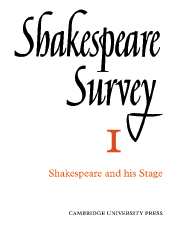Book contents
- Frontmatter
- Studies in the Elizabethan Stage since 1900
- Titus Andronicus on the Stage in 1595
- A Note on the Swan Theatre Drawing
- The Bankside Theatres: Early Engravings
- Shakespeare and the Blackfriars Theatre
- Shakespeare’s Bad Poetry
- The Folger Shakespeare Library
- The Heritage of Shakespeare’s Birthplace
- Three Shakespearian Productions: A Conversation
- Four Lears
- London Productions
- Stratford Productions
- International News
- The Year's Contributions to Shakespearian Study 1 Critical Studies
- 2 Shakespeare’s Life and Times
- 3 Textual Studies
- Books Received
- Index
- Plate section
London Productions
Published online by Cambridge University Press: 28 March 2007
- Frontmatter
- Studies in the Elizabethan Stage since 1900
- Titus Andronicus on the Stage in 1595
- A Note on the Swan Theatre Drawing
- The Bankside Theatres: Early Engravings
- Shakespeare and the Blackfriars Theatre
- Shakespeare’s Bad Poetry
- The Folger Shakespeare Library
- The Heritage of Shakespeare’s Birthplace
- Three Shakespearian Productions: A Conversation
- Four Lears
- London Productions
- Stratford Productions
- International News
- The Year's Contributions to Shakespearian Study 1 Critical Studies
- 2 Shakespeare’s Life and Times
- 3 Textual Studies
- Books Received
- Index
- Plate section
Summary
This season has seen some interesting groups of productions, both of Shakespeare’s plays and of the Elizabethan or Jacobean drama closely associated with Shakespeare, by several London companies. Shakespeare seasons were given by the Old Vic Company, the Advance Players Association, and the Regent’s Park Outdoor Theatre, covering between them a fair proportion of the plays and reaching out to include contemporary drama such as The Alchemist, Volpone and The White Devil.
A surprising feature of the season has been the coincidence of four performances of Lear. Clearly these could best be studied by grouping them together—such an opportunity for close and immediate comparison of various techniques and interpretations rarely arises—and this subject has been treated separately by Charles Landstone, as a single unit (see pp. 98-102). A large part of the Old Vic's work has, in the same way, been dealt with by George Rylands in a general survey, while a short note on the Advance Players' series and on the later Old Vic Richard II will be found at the end of this notice.
ELIZABETHAN DRAMA IN THE WEST END
reviewed by George Rylands
During the war and since, the Old Vic has undergone a complete transformation. The ideals of Miss Bayliss were directed towards the straightforward presentation of Shakespeare at a reasonable cost, the training of young actors, the orchestral rather than the virtuoso performance. These ideals have faded. More has been lost than has been gained and instead of the veterans and tyros of the Waterloo Road we have had a company whose work is very showy, somewhat superficial, and highly successful. It was inevitable that under the conditions of war the public and the critics should become quite undiscriminating. The inherent weaknesses and inequalities of most of the productions and the abandonment of the old tradition and of proper standards within certain necessary limitations have escaped the notice of eyes blinded by the glamour of a few bright particular stars. On the credit side we readily allow that certain individual performances have made theatrical history. Sir Laurence Olivier as Richard III, as Hotspur, as Justice Shallow: Sir Ralph Richardson as Falstaff; Alec Guiness as Lear's Fool. For these creations much may be forgiven.
- Type
- Chapter
- Information
- Shakespeare Survey , pp. 103 - 106Publisher: Cambridge University PressPrint publication year: 1948

